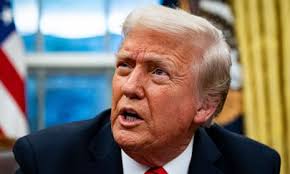Trump’s New Tariffs Ignite Trade War as EU Vows Retaliation
Donald Trump has reignited global trade tensions by imposing steep new tariffs on steel and aluminum imports, drawing sharp criticism from the European Union. European Commission President Ursula von der Leyen condemned the move, calling it unjustified and vowing that the EU would respond with “firm and proportionate” countermeasures.
EU Slams US Tariffs, Warns of Economic Fallout
Von der Leyen made it clear that the EU would not let the US action go unanswered. European Union Trade Commissioner Maros Sefcovic also denounced the decision, warning that the tariffs could fuel inflation and ultimately harm American consumers. Labeling the move a “lose-lose” situation, he emphasized the EU’s willingness to negotiate a mutually beneficial solution with the United States.
Trump’s Tariff Hike and Global Impact
Trump announced the new tariffs on Monday, February 10, raising duties on steel and aluminum imports to a flat 25%—with no exemptions. This measure affects key US trading partners, including Canada, Mexico, Brazil, and South Korea, all of whom had previously enjoyed duty-free access. While the move is designed to protect struggling US industries, it risks escalating trade disputes and triggering retaliatory measures from affected nations.
The tariffs will take effect on March 4, and the White House has confirmed that Trump plans to introduce additional tariffs on countries that impose duties on US goods. He has also hinted at expanding tariffs to other industries, including automobiles, semiconductors, and pharmaceuticals.
Economic Risks and Rising Trade Tensions
Despite international backlash, Trump remains defiant. “I don’t mind,” he said in response to retaliation threats. However, US trade data shows that domestic aluminum production has declined in recent years, making the country more reliant on imports. In 2023, steel imports accounted for 23% of US consumption, with Canada, Brazil, and Mexico being the largest suppliers.
Trump has previously threatened tariffs on Canadian and Mexican imports over border security concerns, though those measures were postponed after diplomatic negotiations. Meanwhile, ongoing tariffs on Chinese goods have already led to reciprocal actions from Beijing, further straining US trade relations.
With Trump doubling down on his protectionist stance, the global economic landscape braces for heightened trade conflicts, and all eyes are now on how key US allies will respond.




